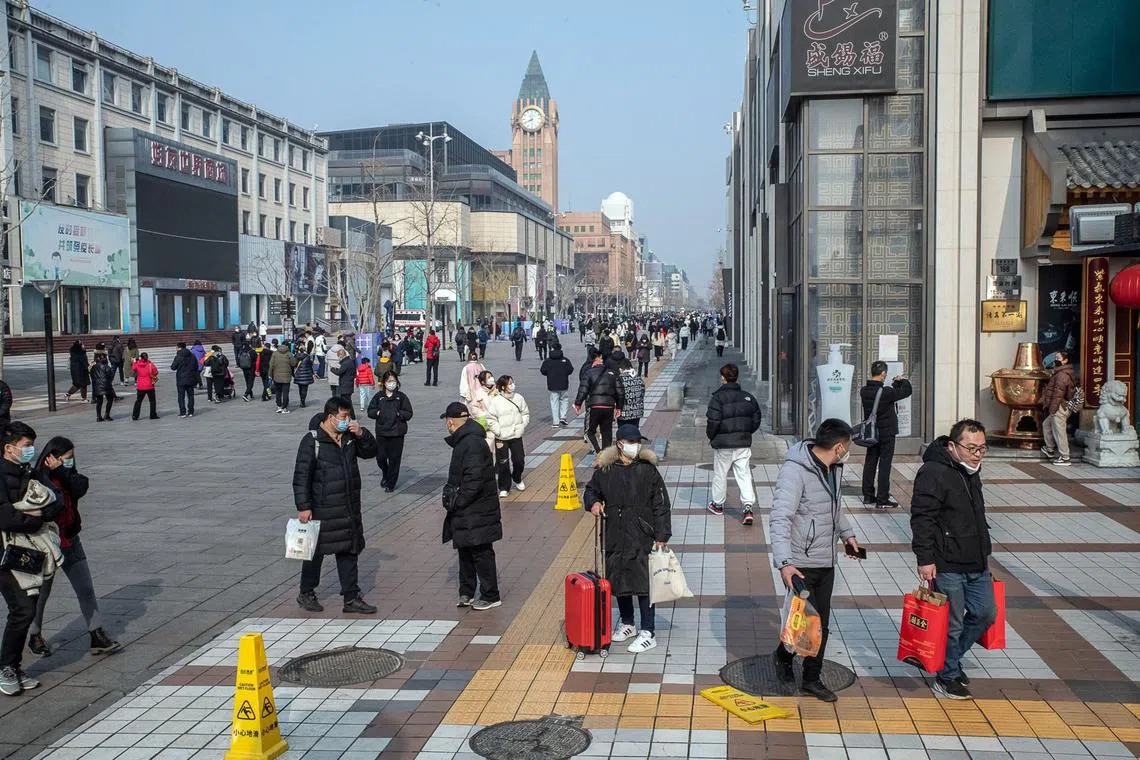Goldman growth fund boosts bets on India as China interest cools
Sign up now: Get ST's newsletters delivered to your inbox

China is struggling to attract capital after the nation’s protracted zero-Covid policy stunted the economy over the past years.
PHOTO: BLOOMBERG
Follow topic:
HONG KONG – Goldman Sachs is ramping up investment of its clients’ money in India and developed markets in the Asia-Pacific as interest in China cools amid political and economic friction.
The New York-based bank is aiming to invest a quarter of its newly raised US$5.2 billion (S$7 billion) growth fund in the region, people familiar with the matter said, who asked not to be named discussing internal information.
In an interview in February, Ms Stephanie Hui, co-head of alternative investing in Asia at Goldman Sachs Asset Management, said the bank has “dialled up” in India, while overall investors are diverting some emerging market capital that was previously earmarked for China.
“While there is excitement about China’s reopening, the capital markets have not rebounded yet and deal flow consequently has not fully bounced back either,” Ms Hui said.
“Public-side investors are seeing some flows back into the stock market but on the private side, there is still a bit of a time gap. In the meantime, India and Japan have been sharing the limelight.”
China is struggling to attract capital after the nation’s protracted zero-Covid policy and a crackdown on private enterprise, including on its biggest tech firms, stunted the economy over the past years.
At the same time, India – and its fast-growing economy – has emerged as a big bet for global financial firms, even though recent troubles at billionaire Gautam Adani’s business empire have dented the allure.
Also, with rising interest rates and slumping stock markets, the global venture capital market has sputtered.
Funding in India dropped to US$2.7 billion in the last quarter, the lowest level in more than two years, according to CB Insights.
Asia has been the prime spot for Goldman’s growth-related investments, comprising almost 50 per cent of the total from 2003 to 2020, the people said.
The growth fund has an average investment size in Asia of US$30 million to US$50 million.
The firm this week led a US$150 million investment in Indian fintech start-up InsuranceDekho, an unusually large investment round that will help it target an under-served domestic market.
It has also invested in Rapyuta Robotics in Japan, and LePure, a single-use bioprocessing solution provider in China.
Apart from India, the current bright spots are in Japan, South Korea and Australia, Ms Hui said.
The bank last year poached Mr David Grayce from Pacific Equity Partners in Australia, rehired Mr Lee Seung-june from TPG Capital for its South Korean business and has built up its Japan team for growth investing to six people, said Ms Hui, who is also co-head of growth equity within the asset management division.
Overall, Goldman now has 35 private equity investment professionals for its growth and buyout team in Asia.
To strengthen its business in China, it relocated partner Michael Hui to Shanghai in the fourth quarter of 2022.
The firm has also beefed up its fund-raising capabilities, recruiting managing directors from Australia, Japan and China.
In late 2019, Mr Stuart Wrigley relocated to Asia as head of alternative capital markets and strategy and was named a partner in November 2022.
Last year, the firm raised US$72 billion for third-party alternative platforms, including across real estate, private equity and credit platforms, as part of an overhaul by chief executive David Solomon to reduce its balance sheet investment portfolio.
In 2022, the bank trimmed its balance sheet alternative investments by US$9 billion to US$59 billion, according to its latest earnings presentation.
More balanced
While China’s economy is now improving after the nation removed its zero-Covid restrictions
“Previously, say two to three years ago, the private equity market in Asia was very concentrated towards China due to sheer scale,” Ms Hui said in the interview. “Now, we are more geographically balanced.”
Across Asia, Goldman will further build up its healthcare network and put capital to work in select enterprise software businesses and the consumer sector, while being more cautious on fintech, she said.
In China, the team has also adjusted its focus in response to the broader environment while being “cautiously optimistic”, she said.
“We are calibrating accordingly. Our focus is on sustainability, healthcare and enterprise software, and we have investments in consumer, while being measured in tech.” BLOOMBERG

